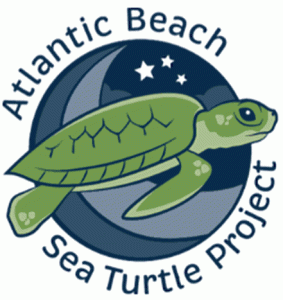Sea Turtle Q & A:
Q: What species of sea turtles have nested in Atlantic Beach, NC?
A: Loggerhead, Green and Kemp’s Ridley
Q: When do sea turtles lay eggs in North Carolina?
A: May-October
Q. I saw a nest roped off on the beach. How did you know there was a nest there?
A. Volunteers patrol every morning during nesting season to find the mother’s tracks. If the mother didn’t false crawl but rather made a body pit and laid a nest, the volunteers will gently dig in the cavity to verify there are eggs. If there are eggs they will rope the area around the nest and post a sign.
Q: When do sea turtle hatchlings emerge from nests in North Carolina?
A: Incubation is typically 50-70 days after the nest is laid. This normally occurs July-November.
Q: What time of day do hatchlings emerge from nests in North Carolina?
A: Typically, the hatchlings emerge from dusk till dawn.
Q: Do the hatchlings emerge from the nest on nights with a full moon?
A: While a full moon could make it easier for the hatchlings to navigate to the ocean, they hatch and emerge regardless of the moon phase.
Q: How do the hatchlings navigate from their nest to the ocean?
A: They mainly use their vision to locate the ocean. On a clear night the moons reflection off the ocean helps them navigate easier. Artificial lights visible from the beach often confuse the hatchlings causing them to misorient and then they are unable to locate the ocean. Learn more on our Lights Out Initiative page.
Q: How often does a mother sea turtle nest in one season?
A: She lays 1-8 nests per season
Q. Does each mother sea turtle nest every year?
A: Most sea turtles nest every two or three years.
Q. Will the hatchlings from Atlantic Beach come back and nest in Atlantic Beach?
A. Maybe! Some mothers have a very small nesting range (site fidelity) and some prefer to spread their nests over 100’s of miles. Atlantic Beach turtles will most likely come back and nest in the same region but not necessarily on Atlantic Beach.
Q. About how old are loggerheads before they start nesting?
A. Around 30 years old.
Q. Can I volunteer if I don’t live here most of the summer?
A. Volunteers need to reside or live in the area during the nesting season of May-October. See our Support page for more information and other ways to help.
Q. Is there an age minimum for volunteering?
A. There are no age requirements as everyone can help participate in saving sea turtles as long as they have their parents’ consent. We have families with young children who volunteer every year.
Q. How can I find out where the nests are and when they are going to hatch?
A. In order to protect the sea turtles, the nest locations and stats are not posted anywhere until the nest is closed (after excavation). No one knows what day a nest will hatch as incubation times vary in nests based off environmental conditions such as the sand’s moisture and temperature. Volunteers sit for hours each night for a couple of weeks waiting for them to emerge from their nest and make the trek to the ocean.
Q. What happens after the nest emerges?
A. Three nights after the nest emerges the volunteers will excavate and inventory the nest cavity. The hatched eggs, whole eggs, alive and dead hatchlings will be counted. The contents of the nest will then be reburied, the results will be recorded and the nest is officially closed out. Live hatchings are released to make their walk to the ocean. Public are welcome to attend the excavations but times will vary depending on weather and tides.
Q. Are turtle-safe flashlights available for nighttime beach strolls?
A. Yes. Turtle-safe flashlights are best to safeguard nesting sea turtles that normally emerge from the ocean at night and to protect hatchlings from disorientation trying to reach the ocean. It also preserves your night vision and of others on the beach.
To Report a North Carolina Sea Turtle Stranding Emergency
Stranding Hotline: 252-241-7367
To Report Sea Turtle Nest Violations
Call NCWRC Hotline: 1-800-662-7137
